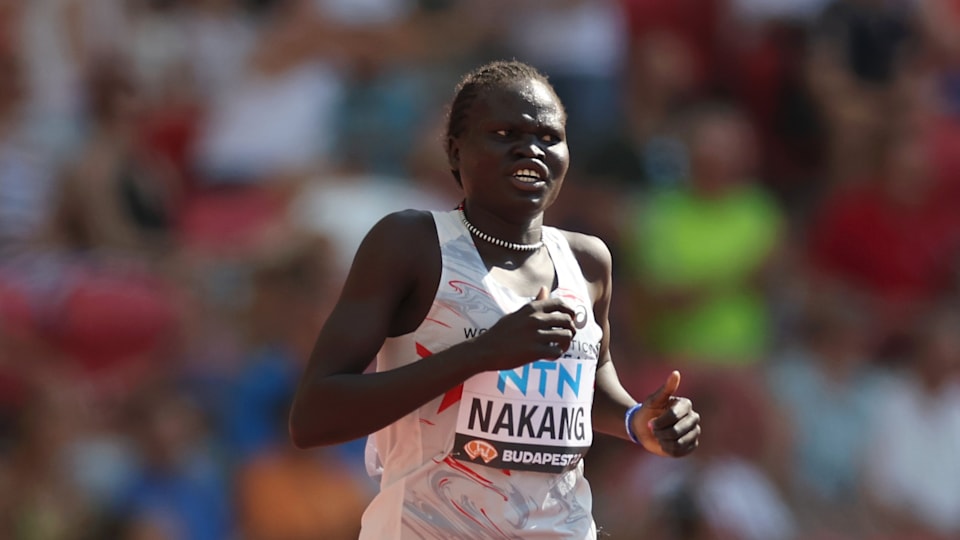Refugee Athlete Perina Lokure Nakang: "I want to emulate Athing Mu and be one of the best 800m runners"
The South-Sudan born runner, who fled war when she was seven, tells Olympics.com how the Olympic champion is inspiring her journey from Kakuma Refugee Camp to global competition.

Perina Lokure Nakang was just seven years old when she escaped war in South Sudan.
She struggled to understand why her parents were sending her away with an aunt.
Teary and frightened, she left behind her home, friends, family, and everything else she knew.
They crossed into neighbouring Kenya and, like thousands of other South Sudanese refugees, settled at the Kakuma Refugee Camp.
“I left South Sudan in 2010 when I was young with my aunt. They told me that we must leave because people were fighting, there was a war, and it was safer for me to be away,” Nakang tells Olympics.com, “I didn’t know even what the word 'war' meant.”
The vast majority of those who fled the largest refugee crisis in Africa were children like Nakang.
She grew up not knowing if she would ever be reunited with her family but, luckily, found her sense of identity in sport.
She indulged in basketball and football at the refugee camp, but found solace in running.
August 2023 was special for Nakang as she boarded a plane for the first time and competed at the same event as her hero, Olympic champion Athing Mu, who also has South Sudanese roots.
She was part of the Athlete Refugee Team at the 2023 World Athletics Championships in Budapest.
How Perine Lokure Nakang found solace in sport
Nakang has only been running for the last four years, a period that has changed her unstable life for the better.
Recently, she was reunited with her mother and four siblings she could barely remember. She has also had to deal with the absence and subsequent death of her father back in South Sudan.
“My mum and my siblings just joined us in Kenya. I was delighted to finally meet my mum, said Nakang, "I recognised her from the photos my aunt used to show me of her.
“Sadly, I never got a chance to meet my dad as he reportedly died mysteriously after I left while herding cattle back home…”
Life in a refugee camp is far from easy, and the 20-year-old has endured plenty of struggles.
She has had to survive on the basic minimum, sport helped her find a routine and a goal.
Nakang observed, "In Kakuma, life can be monotonous. Wake up, fetch water, go to school, then back home. Some days, when you are lucky, you have something to eat. If not, as the eldest, the little that is there you leave for the younger ones.
“Then when I discovered sport, it helped fill my empty and some hard days. I played some basketball, then mostly football, until the day I was drawn to some people running. At first, I didn’t think I was suited for running. One of the coaches encouraged me to try. I started sprinting the 100m and 200m.”
Perina Lokure Nakang's memorable first flight to her debut World Championships
When Kenyan coach Janeth Jepkosgei, the 2007 world 800m champion, began working with young athletes at the Kakuma camp, Nakang was among those she identified with the potential to further their track careers.
Following support from the World Athletics programme, in partnership with the African Higher Education in Emergencies Network and Youth Education and Sports, Nakang moved to Kapsabet - one of the epicentres of running in Kenya - to train and continue her secondary school education.
Her progress has been rapid.
“Since scaling up to 800m I have gone down from a 2:26 runner to running my personal best of 2:13:02 in Nairobi last July where I finished seventh at the Kenyan Trials for the World Championships,” she said.
That performance also qualified her for her biggest event yet, the World Championships.
“This was my first international trip and my first time on a big plane,” she told Olympics.com in Budapest. “I had only boarded a helicopter from Lodwar leaving Kakuma Camp to Nairobi."
In Budapest, she competed in the same stadium as American Mu and a handful of other athletes she has grown to admire in her short running career.
And while she was unable to make it out of the first-round heats, the experience served as great inspiration.
“It was amazing running with some of the best in the 800m. They are Olympic and world champions and have many medals. And here I am just starting out, yet sharing a stage with them,” she shares.
“It inspired me to keep doing what I am doing, train harder and keep improving.”
“It was also so great watching Athing Mu running. I look up to her, as she’s from South Sudan [heritage], and I know I am able to run as well as she is doing. She’s proof that we have the athletic talent.”
Like many athletes, she is now chasing an Olympic-sized dream.
Unlike the vast majority, she will be hoping to make millions of refugees fleeing war and persecution proud by being selected for the Paris 2024 Games.
Nakang is among 70 Refugee Athlete Scholarship-holders who are currently training ahead of selection for the Games.
